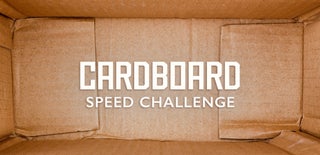Introduction: How to Make Camera Lights
Hello All! Filming and photography are becoming one of my favorite hobbies. And one very important item to remember when it comes to photography or filming is lighting. Lighting is everything. The sun works great to put good lights on subjects or settings, but sometimes I am in a place where there is little to no sunlight. I've tried to mimic sunlight with plain LED lights but what I get turns out more forced and shadowy. What I want is smooth and crisp. So here I'll show you how I fixed my problem by building these super easy diffused LED light holders for taking better quality photos and videos. Let's go!
The Supplies I used for this project were:
- 2x Outdoor Floodlight Holders,
- 2x LED Light bulbs,
- Cardboard,
- White Paper,
- A Glue Stick,
- Tape--I used duck-tape,
- And White Fabric. You could also use interfacing or a white shower curtain. It just has to be something that diffuses light.
The Tools I used in this project were:
- A Straight Edge,
- Pencil,
- Utility or X-Acto Knife,
- Tape Measure,
- Scissors,
- And a Cutting Mat
Step 1: Cutting Out the Rectangles
The first step was to cut out each rectangle for the side pieces. I did this by taking the cardboard and measuring it and then dividing that length by four. I then marked on the cardboard where each of those points were and then cut out the rectangles using the straight edge. Using a L-shaped straightedge helped to make sure I cut them all square.
Step 2: Cutting Out the Trapezoids
I took one piece and measuring the long way, marked the halfway point. Then I traced the the thickness of the bulb shaft using the middle mark as a reference to keep is center. Now that I knew how thick the bulb shaft was, I made two line points from the side of the light-bulb shaft point to the bottom opposite corners, to make an isosceles trapezoid. I then cut off the extra cardboard. After one was done, I traced it onto all the other pieces and cut them out as well.
Step 3: Gluing on the Paper
After all the trapezoid pieces were cut out, I glued a piece of white paper onto one side and then trimmed off the extra paper. This helps to make the light reflect more inside it's enclosure.
Step 4: Taping It All Together
After that I moved onto taping the trapezoid pieces together, just taping one piece at a time. One I had the basic shape done, I moved onto making it more structurally sound by adding more tape to all the edges and cracks.
Step 5: Attaching the Light-bulb
One I had finished taping the body, I also taped on the light-bulbs to hold them in place. If the hole for the bulb shaft was smaller, I probably would have not needed to use tape, but since I made the hole too big, I decided I needed to. I taped the bulb on so that as much as possible of the bulb shaft was showing.
Step 6: Cutting Out & Attaching the Fabric
Then I lay the two light frames on the white fabric and traced them out with 1 1/2 to 2 inches extra on each side. After I cut them out I taped them relatively tightly to the frame. After they were taped on, I snipped off the extra fabric with the scissor and they were done!
Step 7: Testing It Out. Thanks for Viewing!
It's done! In the before and after picture the difference is subtle, but big in my opinion. I was able to get a more crisp image with more focus and I also think the colors turned out better too! Stay tuned because I hope to build a stand for it soon out of PVC pipes.
Subscibe to my YouTube channel! I hope to build a stand for it soon out of PVC pipes.I hope to be getting out many more videos soon!--with better and better image quality. Also in the comments sections please tell me how I could have done it better, something I could do to make it more interesting, or something that you really enjoyed! I would love to hear your feedback! Thanks again!

Participated in the
Cardboard Speed Challenge













